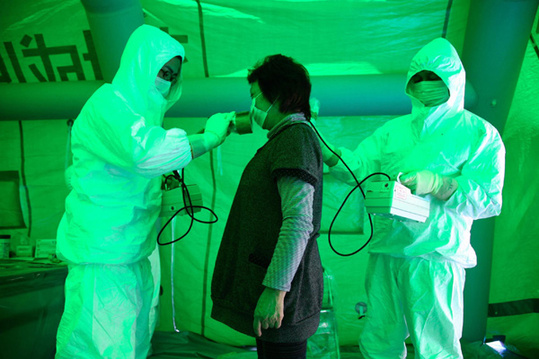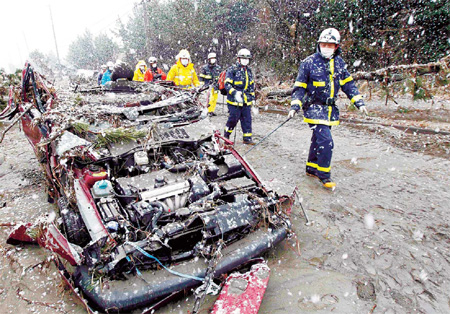Asia
Situation may be 'out of control'
Updated: 2011-03-17 07:58
By Shinichi Saoshiro and Chisa Fujioka (China Daily)
|
|
TOKYO - Japan's nuclear crisis appeared to be spinning out of control on Wednesday after workers withdrew briefly from a stricken power plant because of surging radiation levels and a helicopter failed to drop water on the most troubled reactor.
In a sign of desperation, the police will try to cool spent nuclear fuel at one of the facility's reactors with water cannon.
Earlier on Wednesday another fire broke out at the earthquake-crippled nuclear plant, which has sent low levels of radiation wafting into Tokyo, triggering fear in the capital and international alarm.
Workers were trying to clear debris to build a road so fire trucks could reach reactor No 4 at the Fukushima Daiichi complex, 240 km north of Tokyo. Flames were no longer visible at the building housing the reactor.
High radiation levels prevented a helicopter from flying to the site to drop water into the No 3 reactor to try to cool its fuel rods. Its roof was damaged by an earlier explosion and white steam-like clouds drifted up, probably emitting the burst of radiation that led to the workers' withdrawal.
The plant operator described No 3 as the "priority". That reactor is the only one at Daiichi that uses plutonium in its fuel mix.
According to US government research, plutonium is very toxic to humans and once absorbed in the bloodstream can linger for years in bone marrow or liver and can lead to cancer.
The situation at No 4 reactor, where the fire broke out, was "not so good", the plant operator added, while water was being poured into reactors 5 and 6, indicating the entire six-reactor facility was now at risk of overheating.
Nuclear experts said the solutions being proposed to quell radiation leaks at the complex were last-ditch efforts to stem what could well be remembered as one of the world's worst industrial disasters.
"This is a slow-moving nightmare," said Dr Thomas Neff, a physicist and uranium-industry analyst at the Massachusetts Institute of Technology.
In a rare address to the nation, Emperor Akihito expressed condolences and urged Japan not to give up.
He said he was deeply worried by the country's nuclear crisis that was "unprecedented in scale".
 |
|
Medical staff use a Geiger counter to screen a woman for possible radiation |
"I hope from the bottom of my heart that the people will, hand in hand, treat each other with compassion and overcome these difficult times," the emperor said.
At the Fukushima plant, authorities have spent days desperately trying to prevent water, used to cool radioactive cores of the reactors, from evaporating, which would lead to overheating and possibly a meltdown.
Until the heightened alarm about No 3 reactor, concern had centered on damage to a part of the No 4 reactor building where spent rods were being stored in pools of water, and also to part of the No 2 reactor that helps to cool and trap the majority of cesium, iodine and strontium in its water.
Concern has mounted that the skeleton crews dealing with the crisis might not be big enough or were exhausted after working for days since the earthquake on Friday damaged the facility. Authorities withdrew 750 workers on Tuesday, leaving only 50.
All those remaining were pulled out for almost an hour on Wednesday because radiation levels were too high, but they were later allowed to return.
In the first hint of international frustration at the pace of updates from Japan, Yukiya Amano, director general of the International Atomic Energy Agency, said he wanted more timely and detailed information.
"We do not have all the details of the information so what we can do is limited," Amano told a news conference in Vienna. "I am trying to further improve the communication."
Several experts said the Japanese authorities were underplaying the severity of the incident, particularly on a scale called INES used to rank nuclear incidents. The Japanese have so far rated the accident a four on a one-to-seven scale, but that rating was issued on Saturday and since then the situation has worsened dramatically.
France's nuclear safety authority, ASN, said on Tuesday it should be classed as a level-six incident.
The French government said on Wednesday that Japan was losing control of the situation and urged its nationals in Tokyo to leave the country.
French Industry Minister Eric Besson said: "Let's not beat about the bush. They have visibly lost the essential control (of the situation). That is our analysis, in any case, it's not what they are saying."
Officials in Tokyo said radiation in the capital was 10 times normal at one point but not a threat to human health in the sprawling high-tech city of 13 million people.
Meanwhile, China will give 10,000 tons of diesel and 10,000 tons of gasoline free to Japan to help the country battle shortages, the Xinhua News Agency said on Wednesday.
State oil firms PetroChina and Sinopec will provide the fuel to Japan, it said, adding that China will offer more aid based on the needs of Japan.
AP contributed to this story.
Reuters
E-paper

City of Joy
Welcome to the 'world of smiles' where life meanders slowly.
Debate on nuclear power revived
The future is now
Common approach
Specials

Earthquake Hits Japan
A massive 8.8 magnitude quake hit the northeast coast of Japan on March 11,2011.

NPC & CPPCC sessions
Lawmakers and political advisers gather in Beijing to discuss major issues.

Slide: Japan quake
Devastating earthquake and tsunami left millions without water, electricity, homes or heat.

